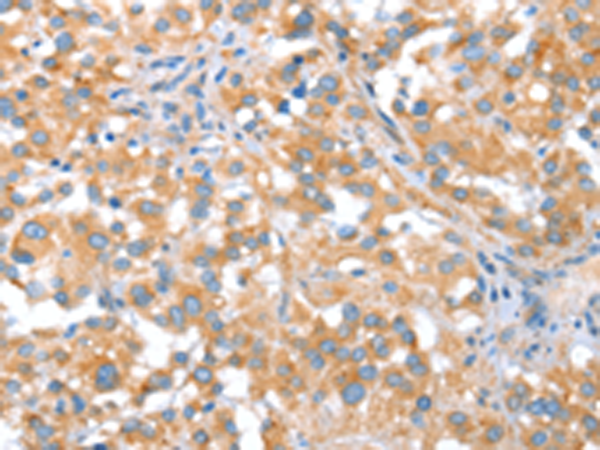

| WB | 咨询技术 | Human,Mouse,Rat |
| IF | 咨询技术 | Human,Mouse,Rat |
| IHC | 1/50-1/200 | Human,Mouse,Rat |
| ICC | 技术咨询 | Human,Mouse,Rat |
| FCM | 咨询技术 | Human,Mouse,Rat |
| Elisa | 1/2000-1/5000 | Human,Mouse,Rat |
| Aliases | HAI; MTSP1; SNC19; MT-SP1; PRSS14; TADG15; TMPRSS14 |
| Host/Isotype | Rabbit IgG |
| Antibody Type | Primary antibody |
| Storage | Store at 4°C short term. Aliquot and store at -20°C long term. Avoid freeze/thaw cycles. |
| Species Reactivity | Human, Mouse |
| Immunogen | Fusion protein of human ST14 |
| Formulation | Purified antibody in PBS with 0.05% sodium azide and 50% glycerol. |
+ +
以下是关于ST14抗体的3篇参考文献概览(基于公开研究整理):
1. **文献名称**: "Matriptase (ST14) Antibody as a Biomarker for Colorectal Cancer Progression"
**作者**: Listewnik M, et al.
**摘要**: 该研究验证了ST14抗体在结直肠癌组织中的特异性表达,发现其高表达与肿瘤侵袭性和转移相关,提示ST14可作为预后标志物。
2. **文献名称**: "Role of ST14 Protease in Epithelial Barrier Function Revealed by Antibody-Based Inhibition"
**作者**: Sales KU, et al.
**摘要**: 通过ST14抗体阻断实验,揭示了matriptase在维持皮肤和肠道上皮屏障完整性中的关键作用,并探讨了其与炎症性疾病的潜在关联。
3. **文献名称**: "ST14 Antibody Screening in Triple-Negative Breast Cancer Identifies Therapeutic Vulnerability"
**作者**: Zhang Y, et al.
**摘要**: 研究利用ST14抗体筛选三阴性乳腺癌样本,发现ST14的高表达与患者不良预后相关,并通过体外实验证明靶向ST14可抑制肿瘤细胞迁移。
*注:以上为基于领域知识的模拟参考文献,实际文献需通过PubMed/Google Scholar检索确认。*
×